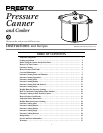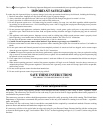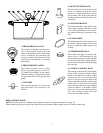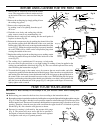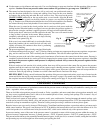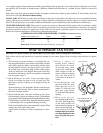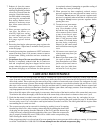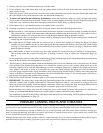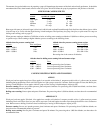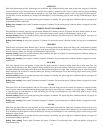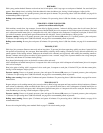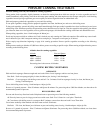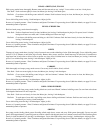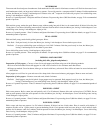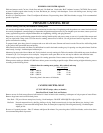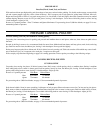
2
This is a Listed appliance. The following Important Safeguards are recommended by most portable appliance manufacturers.
IMPORTANT SAFEGUARDS
To reduce the risk of personal injury or property damage, basic safety precautions should always be followed, including the following:
1. Read all instructions. Improper use may result in bodily injury or property damage.
2. Always check the vent pipe before use. Hold cover up to light and look through vent pipe to be certain it is clear.
3. Always check the air vent/cover lock to be sure it moves freely before use.
4. Do not fill pressure canner over
2
⁄
3
full when using for pressure cooking. For soup, rice, and dried vegetables which expand dur-
ing cooking, do not fill canner over
1
⁄
2
full. Overfilling may cause a risk of clogging the vent pipe and developing excess pressure.
See food preparation instructions.
5. Do not pressure cook applesauce, cranberries, rhubarb, pearl barley, cereals, pastas, grains, split peas, or soup mixes containing
dry beans or peas. These foods tend to foam, froth, and sputter and may block the vent pipe, overpressure plug, and air vent/cover
lock.
6. This appliance cooks under pressure. Improper use may result in scalding injury. Make certain pressure canner is properly closed
before operating; cover handles must be directly above the body handles. See “How To Use” instructions.
7. Do not place the pressure canner or attempt to pressure can or cook in a heated oven.
8. Caution: Do not use pressure canner on an outdoor LP gas burner or gas range over 12,000 BTU’s.
9. Extreme caution must be used when moving a pressure canner containing hot liquids. Do not touch hot surfaces. Use handles or
knobs.
10. Do not open canner until internal pressure has been completely reduced, air vent/cover lock has dropped, and no steam escapes
when the pressure regulator is removed. See “How To Use” instructions.
11. Caution: To ensure safe operation and satisfactory performance, replace the overpressure plug every time you replace the sealing
ring or sooner if it becomes hard, deformed, cracked, worn, or pitted. It is recommended that the sealing ring and overpressure plug
be replaced at least every three years.
12. Close supervision is necessary when the pressure canner is used near children. It is not recommended that children use the pres-
sure canner.
13. When normal operating pressure is reached, the pressure regulator will begin to rock. Gradually lower the heat as necessary to
maintain the pressure. If the pressure regulator is allowed to rock vigorously, excess steam will escape, liquid will be evaporated,
and food may scorch.
14. Do not use this pressure canner for other than intended use.
15. Do not use this pressure canner for pressure frying with oil.
SAVE THESE INSTRUCTIONS
THIS PRODUCT IS FOR HOUSEHOLD USE ONLY.
GeTTinG aCquainTed
Your canner is a special, large capacity pressure vessel designed for home canning a wide variety of fruits, vegetables, meats,
and poultry. The canner may also be used to fast cook many of your favorite foods in larger quantities than can be prepared in a
conventional size pressure cooker.
The canner uses pressure to achieve the high temperatures required for safely processing foods while canning. The United States
Department of Agriculture recommends the pressure canner as the only safe method for canning low-acid foods—vegetables,
meats, and poultry.
The canner will also cook many foods in one-third to one-tenth the time required by conventional methods. Pressure cooking
preserves flavor and nutrients and tenderizes tougher cuts of meat.
It is necessary to follow a few special rules in using and caring for your Pressure Canner. Become familiar with the various parts
as shown in the diagram on page 3 and read the “How To Use” sections beginning on Pages 4, 6, 19, and 21, before using for the
first time.



